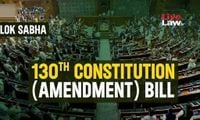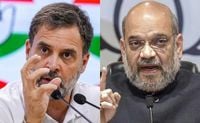Tempers flared in New Delhi on August 25, 2025, as Union Home Minister Amit Shah fiercely defended the government’s proposed Constitution (130th Amendment) Bill, which seeks to automatically remove Prime Ministers, Chief Ministers, and other ministers from office if they are arrested and detained for 30 consecutive days on serious criminal charges. The bill, which would amend Articles 75, 164, and 239AA of the Indian Constitution, has sparked a firestorm of protests and accusations in Parliament, with opposition parties calling it an assault on democracy and a tool for political vendetta.
At the heart of the controversy is a simple but loaded question: Can a country be governed by leaders sitting behind bars? Amit Shah, in a no-holds-barred interview with ANI, was adamant. “Can a Chief Minister, Prime Minister, or any leader run the country from jail? Does that suit the dignity of our democracy?” he asked, dismissing the idea outright. According to The Times of India, Shah went further, painting a vivid picture of a jailhouse-turned-government headquarters, with top officials taking orders from incarcerated leaders. “Even today, they are trying that if they ever have to go to jail, they will easily form the government from jail. The jail will be made CM House, PM House and the DGP, Chief Secretary, Cabinet Secretary or Home Secretary will take orders from the jail. My party and I completely reject the idea that this country cannot be governed without the person who is sitting there.”
The bill’s main thrust is clear: if any minister is in custody for 30 straight days on charges that could lead to five years or more in prison, they will automatically lose their post on the 31st day. Shah insisted that this would not affect a party’s majority in Parliament or state assemblies. “One member will go, other members of the party will run the government, and when they get bail, they can come and take the oath again. What is the objection in this?” he asked, as reported by Hindustan Times.
Shah revealed that Prime Minister Narendra Modi himself had insisted on including the office of PM under the scope of the bill, a move he contrasted with historical precedents. “Earlier, Indira Gandhi had brought 39th amendment (of protecting the President, VP, PM, and Speaker from judicial review by Indian courts) … Narendra Modi ji has brought a constitutional amendment against himself that if the Prime Minister goes to jail, he will have to resign,” Shah explained in his interview, according to The Hindu.
But the opposition was having none of it. The bill’s introduction in Parliament was met with uproar. Lawmakers tore up copies of the bill and hurled paper bits at Shah as he tabled the One Hundred and Thirtieth Amendment Bill, 2025. The opposition accused the government of trying to create a “police state,” alleging that the bill would allow the BJP to misuse central agencies, frame non-BJP Chief Ministers, and destabilize state governments. “The general complaint is that the BJP is using the ED as a tool for political gain. The entire country knows who is misusing democracy. They are the most hypocritical people, and they want to show that they are monarchs, not democrats,” said DMK leader TKS Elangovan, speaking to ANI and quoted by Hindustan Times.
Congress MP Manickam Tagore did not mince words either, calling Shah’s remarks on morality “the greatest joke of the century.” Tagore argued, “Mr Amit Shah is speaking about morality. The person who was sent out of Gujarat, the person who was responsible for organised attacks by the police. We all know that the bill has been vehemently opposed by many of the BJP’s allies. This bill targets those in power. This bill will be defeated in the House...He is not qualified to speak about morality...” Congress leader Bhupesh Baghel joined the chorus, calling the bill a “weapon” in the hands of police officers and criticizing the manner in which it was introduced without consulting the Speaker.
Amid the din, Shah accused the opposition of double standards. He recalled how, in 2013, Rahul Gandhi had publicly rejected and even tore up an ordinance brought by the Manmohan Singh-led UPA government that protected convicted ministers. “Rahul Gandhi publicly called that ordinance nonsense and even tore it up in a press conference. The decision made by their own Prime Minister was mocked, and the PM became a sorry figure in front of the world. But now, the same Rahul Gandhi, to form a government in Bihar, is hugging Lalu Yadav who has been convicted. Isn’t this double standards?” Shah asked, as reported by The Times of India.
Shah also cited the case of AAP leader Satyendra Jain, who was jailed in four cases and is facing trial. He accused Congress and other opposition parties of falling victim to what he called “AAP’s propaganda.” Shah’s message was clear: “We have also protested on different issues, but stopping the presentation of a bill in Parliament is not democratic. The Opposition must answer to the people.”
Despite the uproar, Shah moved a motion in the Lok Sabha to refer the three bills to a Joint Parliamentary Committee (JPC) for further discussion. This committee, comprising 31 members from both houses, will scrutinize the proposed amendments before they come up for a final vote. “Let me make it clear, when an elected government brings a constitutional amendment in Parliament, protest is allowed. I’ve already said that this amendment will be sent to a joint committee of both Houses. Everyone can share their opinion there, and during voting, you can express your views. Since this is a constitutional amendment, it requires a two-thirds majority. But is it appropriate in a democracy that the bill is not even allowed to be presented in Parliament?” Shah questioned, as reported by The Hindu.
The opposition, meanwhile, remains steadfast in its belief that the bill is a tool for centralizing power and silencing dissent. “These are the people who never respect democracy... BJP is a bunch of liars,” said Elangovan. Others argue that the bill’s automatic removal provision could be misused by those in power to sideline political opponents through legal means, especially given the broad powers of investigative agencies in India.
As the bill heads to the JPC for review, the nation watches closely. The debate has exposed deep rifts in Indian politics over the balance between accountability and the risk of political persecution. Whether the bill will ultimately pass, and in what form, remains to be seen. One thing is certain: the coming weeks will test not just the strength of India’s constitutional framework, but also the resilience of its democracy.


